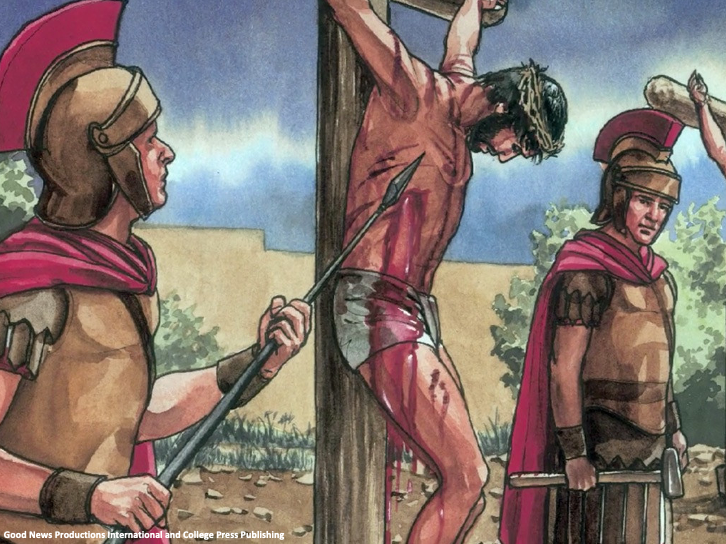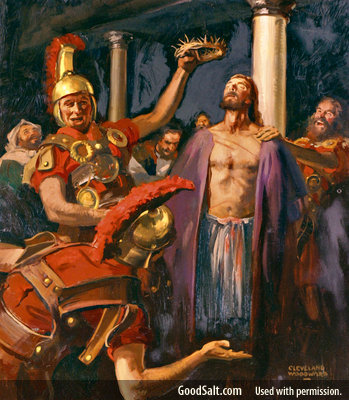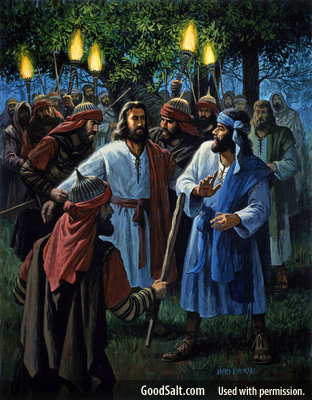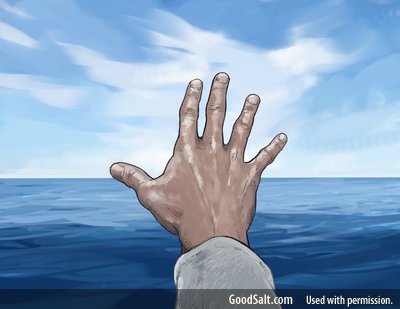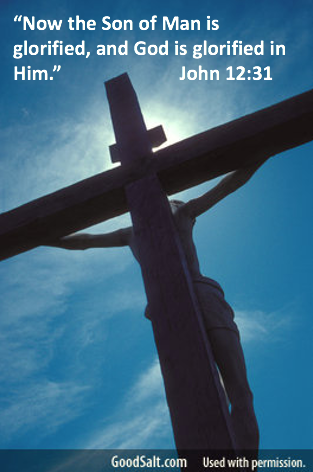“After this, Joseph of Arimathea, being a disciple of Jesus, but secretly, for fear of the Jews, asked Pilate that he might take away the body of Jesus; and Pilate gave him permission. So he came and took the body of Jesus.” John 19:38
We are learning lasting lessons from the last day in Jesus’ life found in John 19. So far we have discovered…
– Like Pilate, we can avoid doing the right thing because of the cost involved (John 19:4-7).
– No one has power in this world except what is given to them by God (John 19:8-12).
– The closer we get to the cross, the more clearly we see who people really are, including ourselves (John 19:13-16).
– The cross is the total expression of God’s grace to us in Christ (John 19:17-18a).
– The two crosses teach that God gives each of us the freedom to choose (John 19:18b).
– There is no person or language God will not use to proclaim who Jesus is (John 19:19-22).
– Jesus’ garments were removed so we could wear the garments of salvation (John 19:23-24).
– Though Jesus died for the world, He also cares deeply for me (John 19:25-27).
– Jesus became thirsty to save us from an eternal thirst (John 19:28-29).
– We cannot work our way to heaven because we cannot pay a debt that is already paid (John 19:30).
– Jesus’ legs were not broken and His side was pierced so we may believe Jesus is our Passover Lamb Who died for us (John 19:31-37).
Today the final lesson is AS DISCIPLES OF JESUS, WE ARE TO OPENLY IDENTIFY WITH HIM NO MATTER WHAT THE COST (John 19:38-42). John now gives an account of Jesus’ burial to substantiate further that Jesus actually died. “After this, Joseph of Arimathea, being a disciple of Jesus, but secretly, for fear of the Jews, asked Pilate that he might take away the body of Jesus; and Pilate gave him permission. So he came and took the body of Jesus.” (John 19:38). We do not bury a living person. We bury a dead person. The proof that Jesus died was that He was buried.
“Normally the Romans placed the bodies of crucified offenders, whose bodies they did not leave to rot on their crosses, in a cemetery for criminals outside the city.” 1 Family members could not claim the bodies of people who had undergone crucifixion as punishment for sedition.” 2 But two of Jesus’ friends intervene to give Christ a proper burial.
The other gospel writers inform us that “Joseph of Arimathea” was “a rich man” (Matthew 27:57) “waiting for the kingdom of God,” who was also “a good and just man” (Luke 23:50). Although he was a “prominent… member” of the Jewish Supreme Court called the Sanhedrin (Mark 15:43), “he had not consented to their decision” to crucify Christ (Luke 23:51).
Only John tells us he was “a disciple of Jesus, but secretly, for fear of the Jews,” particularly the unbelieving Jewish leaders. Despite his fears, Joseph courageously “asked Pilate that he might take away the body of Jesus; and Pilate gave him permission.” So Joseph “came and took the body of Jesus” down from the cross to give Him a proper burial.
But Joseph was not alone in doing this. He was accompanied by another member of the Sanhedrin. “And Nicodemus, who at first came to Jesus by night, also came, bringing a mixture of myrrh and aloes, about a hundred pounds.” (John 19:39). Unlike disciples of Jesus who fled for fear of the Jews, both Joseph and Nicodemus now boldly identified themselves with Jesus. But they were not always willing to do this.
John mentions that Nicodemus “first came to Jesus by night.” John emphasizes this each time he mentions Nicodemus in his gospel (cf. John 3:2; 7:50). 3 Earlier John wrote, “42 Nevertheless even among the rulers many believed in Him, but because of the Pharisees they did not confess Him, lest they should be put out of the synagogue; 43 for they loved the praise of men more than the praise of God” (John 12:42-43). Prior to asking Pilate for Jesus’ dead body, it appears that both Joseph and Nicodemus had been secret disciples who were reluctant to openly confess Jesus because they feared what the Pharisees would do to them if they did. Openly identifying with Christ could result in both these men “losing their seats in the Sanhedrin and, worse yet, being refused the right to worship in the synagogue (cf. 9:22; 12:42).” 4
Although they had probably believed in Jesus for His gift of salvation earlier (John 12:42), they were not willing to walk in the light of fellowship with Jesus by openly confessing Christ among their religious colleagues. Why? Because “they loved the praise of men more than the praise of God” (John 12:43). They cared more about what people thought of them instead of what God thought of them. They were people-pleasers, not God-pleasers. They chose to walk in the darkness by refusing to confess Christ before others. They wanted the approval of men more than the approval of God.
Does this sound familiar to you? We do not want to speak up for Christ because we are afraid of what people will think or do to us. When we refuse to openly tell others about Jesus’ saving grace, we are no longer walking in the light. We are hiding in the darkness because we are ashamed of the precious cleansing blood of Jesus Christ. When we turn away from God to please people, we are telling God, “I don’t want Your praise, Father. I don’t need it!” In other words, we are out of fellowship with God (cf. I John 4:15).
But now John presents both Nicodemus and Joseph in a favorable light as they openly identify with Jesus in the daylight by asking permission to give Christ a proper burial. It took a lot of courage for them to do this. What had changed in their lives for them to have such courage? Based on John’s discipleship theme in his gospel, I would suggest that these men had grown in their relationship with Jesus to the point of caring more about what Christ thought of them than what people thought of them. “The death of Jesus so moved Nicodemus and Joseph that they cast aside their fears and boldly claim Jesus’ body, prepare Him for burial, and bury Him.” 5 They had come out of the darkness into the light of fellowship with Jesus Christ (cf. John 3:19-36; I John 1:5-9).
The same is true for us. We may begin our Christian lives afraid of what people may think or do to us if we openly identify with Jesus Christ. But as we grow in our relationship with Jesus, our boldness for Him will also grow (cf. John 7:26; Acts 4:13, 29-31; 9:27; Philippians 1:20-21; I Thessalonians 2:1-10; I John 4:17). The courage that the Holy Spirit gives to us will overcome our fears (Acts 4:23-31). Christ’s radical love for us will squelch our fears (cf. I John 4:18). More and more we will seek to please Jesus rather than people (Colossians 3:23-24; I Thessalonians 2:4).
John tells us that Nicodemus brought “about a hundred pounds” of “myrrh and aloes” to prepare Jesus’ dead body for burial (John 19:39). “‘Myrrh’ was a fragrant resin that the Jews turned into powder, and then mixed with ‘aloes,’ which was powdered sandalwood.” 6 “The purpose of covering a corpse with this aromatic powder was to dry it out and to lessen the foul odor that putrefaction caused.” 7
The amount of aromatic spices is significant for such a large quantity was commonly used only for kings. 8 This amount of burial spices reflects Nicodemus’ great love and respect for Jesus. Isn’t this amazing!?! Even though Christ was dead, Nicodemus’ love for Him was very much alive.
“Then they took the body of Jesus, and bound it in strips of linen with the spices, as the custom of the Jews is to bury.” (John 19:40). “Because it was almost the Sabbath (which began at sundown) the burial had to take place quickly. Jewish burial customs did not involve mummification or embalming, which took out the blood and body organs. Their normal process was to wash a body and cover it with cloth and aromatic oils or spices.” 9
John mentions the “strips of linen” wrapped around Jesus’ body to emphasize that Christ was truly dead. The use of “strips of linen” argues against the authenticity of the Shroud of Turin, which is often associated with Jesus’ burial. 10 As long as there were no graveclothes, no tomb, and no coroner, there was hope. But the arrival of the graveclothes signified the departure of any hope. 11
This is amazing to think about from Joseph’s and Nicodemus’ perspective. Earlier in the week, Jesus triumphantly entered Jerusalem with shouts of joy from the great multitude. The people who praised Jesus as their King days earlier then called for His death on Friday. These linens were a physical reminder that their Friend and His future were wrapped in graveclothes and sealed behind a rock. These two brave men did not know on that Friday what we now know. They didn’t know that Friday’s calamity would become Sunday’s celebration! 12 Yet, they remained loyal to Jesus even in His death.
If that had been you or me, what would we have done? After all, the crowds were pleased with Jesus’ crucifixion. What was to keep the religious leaders from calling for more executions? Let’s be honest. If we were in Joseph’s or Nicodemus’ sandals, we would have left town as quickly as possible!
But Joseph and Nicodemus did not flee. Why? Because Jesus was their Friend and they loved Him. You don’t abandon a dear Friend, even when He is dead.This seems to be what these two men are thinking. The manner in which Jesus lived and died deeply impacted their lives.
Next John tells us, “Now in the place where He was crucified there was a garden, and in the garden a new tomb in which no one had yet been laid.” (John 19:41). Jesus’ body was placed in a new tomb in a private “garden,” not in a public cemetery. 13
“In Palestine, bodies were buried in natural caves or tombs that were carved out of the limestone. Niches or shelves were prepared where the bodies could be laid. The tomb was customarily sealed with a disc-shaped stone that could be rolled across the entrance. The tomb was usually a family tomb, and the niches would be reused as necessary. The bones of the previous occupant would simply be collected and placed in a bone-box, or ‘ossuary,’ that remained in the tomb.” 14
John is the only gospel writer to mention that Jesus was buried in a “garden.” “Why would he mention this? This may well be an illusion to the Garden of Eden in Genesis 3. Adam and Eve were driven out of the Garden of Eden and away from the tree of life. But Jesus, the second Adam, dies on a tree to redeem man and re-open paradise (cf. Rev 2:7).” 15
Matthew tells us that this tomb belonged to Joseph. He laid Jesus’ body “in his new tomb which he had hewn out of the rock; and he rolled a large stone against the door of the tomb, and departed.” (Matthew 27:60). The placement of Jesus’ body in Joseph’s tomb fulfilled Isaiah’s prophecy about the Messiah, Who would be “with the rich at His death.” (Isaiah 53:9).
John includes a very significant detail when he writes, “a new tomb in which no one had yet been laid.” (John 19:41b). When Jesus’s body was gone after His resurrection, “no one was able to point to any bones in the tomb to claim them as Jesus’s remains. His was the first corpse to lie there.” 16
John concludes this section when he writes, “So there they laid Jesus, because of the Jews’ Preparation Day, for the tomb was nearby.” (John 19:42). Christ’s burial was somewhat of a hasty measure because the “Jews’ day of preparation” before the Sabbath (i.e., Friday) was about to end with the fast approaching sunset.
Joseph and Nicodemus were not expecting the resurrection, yet they were willing to risk their riches, their reputations, their religious privileges, and possibly their own lives out of love and respect for Jesus. Their sacrifices will be greatly rewarded in eternity.
For the Bible promises that when we invest our riches in what is eternal while we live here on earth, we will store up permanent treasures in heaven (Matthew 6:19-21). When we risk our reputations and even rejection for Christ by publicly confessing Him before our enemies, Jesus will give us a good confession before God the Father and His holy angels in heaven (Matthew 10:32; Luke 12:8; Revelation 3:5b). When we sacrifice religious privileges and even our own lives here on earth for Christ, He will give us greater authority and privileges in heaven (Mark 10:29-31; Revelation 2:7, 17, 25-27; 3:11-12, 21).
When I ran track in high school, I trained hard because I wanted to win a medal in my race. Even though I had failed to win a medal in previous races, I still prepared for the next race thinking I could win. Keeping the thought of winning a medal in the front of my mind as I trained and eventually competed in the race, motivated me to do my very best and not give up.
The same is true in our Christian lives. There are certain eternal rewards that require us to live faithfully for Jesus to the end of our Christian lives. To do this, it is important to train our minds to imagine Jesus rewarding us at the Judgment Seat of Christ, saying to us, “Well done, good and faithful servant; you were faithful over a few things, I will make you ruler over many things. Enter into the joy of your lord.” (Matthew 25:21). Like an athlete who visualizes himself winning a race, visualizing ourselves remaining faithful to Christ and receiving this reward from Him will actually create new neurological pathways in our brain. And our brains respond the same way to mental rehearsing of a task and actually performing the task.
I believe Isaac Watts captured the impact that God meant for the cross to have on our lives when he wrote the song, “When I Survey the Wondrous Cross.” The first stanza reads:
When I survey the wondrous cross
On which the Prince of Glory died,
My richest gain I count but loss,
And pour contempt on all my pride.
Prayer: Precious heavenly Father, thank You for the example of Joseph and Nicodemus who sacrificed so much to ensure that Jesus received a proper burial. Even though their sacrifices were costly, dangerous, and without personal gain, they did this out of love and respect for their dear Friend, Jesus Christ, Who deeply touched their lives. They started out hesitant to associate with Jesus, but the more they grew in their relationship with Him, the more their boldness grew. The same can be true for us. Help us to focus on the cross so that no sacrifice will seem too great for us in light of the wondrous love of Jesus my Savior. In His matchless name we pray. Amen.
ENDNOTES:
1. Tom Constable, Notes on John, 2017 Edition, pg. 363 cites Josephus, Antiquities, 5:1:14.
2. Ibid., cites Donald A. Carson, The Gospel According to John (Leicester, England: Inter-Varsity Press, and Grand Rapids: Wm. B. Eerdmans Publishing Co., 1991, pg. 629.
3. Robert Wilkin; J. Bond; Gary Derickson; Brad Doskocil; Zane Hodges; Dwight Hunt; Shawn Leach. The Grace New Testament Commentary: Revised Edition (Grace Evangelical Society, Kindle Edition, 2019), pg. 562.
4. Ibid., pg. 561.
5. Ibid., pg. 562.
6. Tom Constable, Notes on John, pg. 363 cites Donald A. Carson, The Gospel According to John (Leicester, England: Inter-Varsity Press, and Grand Rapids: Wm. B. Eerdmans Publishing Co., 1991, pg. 629.
7. Tom Constable, Notes on John, pg. 363.
8. Max Lucado, He Chose The Nails (Nashville: Word Publishing, 2000), pg. 121.
9. Edwin A. Blum, The Bible Knowledge Commentary Gospels, Editors John F. Walvoord and Roy B. Zuck, (David C Cook, 2018 Kindle Edition), pg. 694.
10. Ibid., pg. 695; cf. Leon Morris, The Gospel According to John: Revised Edition, New International Commentary on the New Testament series (Grand Rapids: Wm. B. Eerdmans Publishing Co., 1995), pg. 730.
11. Adapted from Max Lucado, He Chose The Nails, pg. 121.
12. Ibid.
13. Edwin A. Blum, The Bible Knowledge Commentary Gospels, pg. 695.
14. J. Carl Laney, Moody Gospel John Commentary (Chicago: Moody Press, 1992), pg. 354; cf. Ralph Gower, The New Manners and Customs of Bible Times (Chicago: Moody, 1987), pp. 72-74).
15. Robert Wilkin, The Grace New Testament Commentary: Revised Edition, pg. 562.
16. Tony Evans, CSB Bibles by Holman. The Tony Evans Bible Commentary (B & H Publishing Group, Kindle Edition, 2019), pg. 1826.


